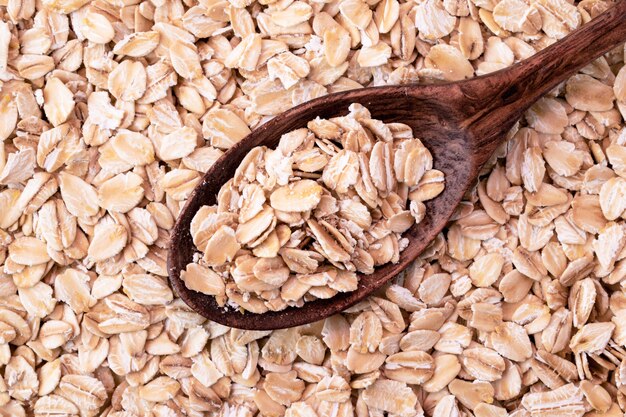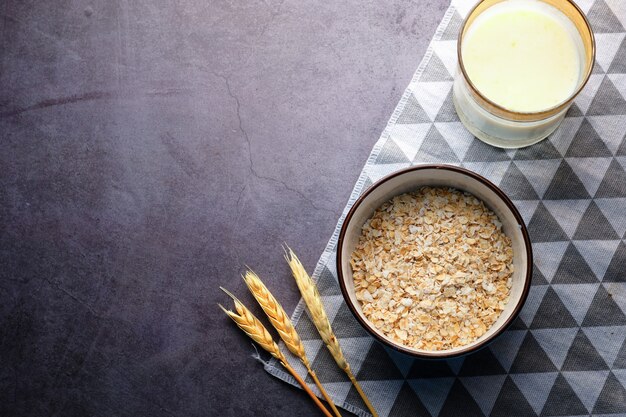Oats have long been a favorite breakfast choice for many people around the world. They are not only versatile and delicious but also packed with nutrients that make them a star in the health food world. As more people prioritize wellness and heart health, oats have gained significant attention for their potential benefits.
In the United States, where dietary trends emphasize high-fiber and heart-healthy foods, oats perfectly fit the bill. This article explores the nutritional profile of oats and their benefits for the heart, weight management, blood sugar control, and even skincare. Let’s dive into what makes oats a health powerhouse.
Nutritional Profile of Oats
Oats are a nutritional goldmine. They are loaded with key nutrients that make them a staple in healthy eating plans.
What Are the Nutrition Facts of Oats?
Oats are rich in essential nutrients that contribute to overall health. Here are some highlights:
- Fiber: Oats are a great source of beta-glucan, a soluble fiber that helps lower cholesterol levels and improves gut health.
- Protein: A single serving of oats contains about 5 grams of protein, which supports muscle repair and growth.
- Vitamins: Oats provide several B vitamins, including thiamine and folate, which are essential for energy production and brain function.
- Minerals: Oats are high in magnesium, iron, and zinc, all of which play crucial roles in maintaining health.
In terms of calories, one cup of cooked oats has about 150 calories, with a balanced macronutrient breakdown of carbohydrates, protein, and a small amount of healthy fat.
Are Oats Healthy Carbs?
Absolutely! Oats are considered complex carbohydrates, which means they are digested slowly and provide a steady release of energy.
Unlike simple carbohydrates that cause blood sugar spikes, oats help maintain stable glucose levels. Compared to other carb sources like white bread or sugary cereals, oats are a healthier choice. Their fiber content also adds to their slow-digesting nature, making them perfect for sustained energy throughout the day.
Related to Read: Are Honey Bunches of Oats Healthy?
Health Benefits of Oats
From heart health to skin care, oats offer many health benefits.
Are Oats Healthy for Your Heart?
Yes, oats are exceptionally heart-healthy. The secret lies in their beta-glucan content. This soluble fiber helps reduce LDL (bad) cholesterol by forming a gel in the gut that binds cholesterol and prevents its absorption.
The FDA has even approved health claims linking oats to reduced cholesterol and improved heart health. Eating oats regularly can lower your risk of heart disease, especially when paired with a balanced diet and active lifestyle.
Are Oats Healthy for Weight Loss?
If you’re looking to manage your weight, oats can be your best friend. Their high fiber content promotes a feeling of fullness, which helps reduce overall calorie intake.
Beta-glucan in oats slows digestion, making you feel satisfied for longer periods. Additionally, oats are low in calories and packed with nutrients, making them a perfect choice for those trying to lose weight.
So, can oats help you lose weight? Absolutely! Add them to your breakfast routine, and you’ll notice a difference in your appetite and energy levels.
Are Oats Healthy for Diabetics?
For people with diabetes, managing blood sugar levels is crucial. Oats have a low glycemic index, which means they cause a slower rise in blood sugar compared to high-GI foods.
Research shows that oats can improve insulin sensitivity and help manage type 2 diabetes. Their beta-glucan content helps control glucose absorption, keeping blood sugar levels stable after meals. Incorporating oats into your diet can be a smart step toward better diabetes management.
Oatmeal Benefits for Skin
Oats are not just good for your diet—they’re also amazing for your skin! Colloidal oatmeal, made by grinding oats into a fine powder, is commonly used in skincare products.
Here’s why oats are great for your skin:
- Anti-inflammatory properties: Oats soothe irritated skin and reduce redness.
- Moisturizing benefits: Oatmeal helps retain moisture, making it ideal for dry skin.
- Eczema relief: Studies show that oatmeal can alleviate symptoms of eczema and other skin conditions.
From oatmeal baths to face masks, oats are a natural remedy for glowing, healthy skin.
Types of Oats and Their Benefits
Oats come in several forms, each with unique characteristics and benefits. Understanding the differences can help you choose the best option for your diet.

What Are the Different Types of Oats?
Oats are processed into various types depending on how they’re prepared for consumption. Here’s a comparison of the most common types:
- Steel-Cut Oats: These are whole oat groats cut into small pieces. They have a chewy texture and take longer to cook, usually 20–30 minutes.
- Rolled Oats: Also known as old-fashioned oats, these are steamed and flattened into flakes. They cook faster than steel-cut oats and have a soft texture.
- Quick Oats: These are similar to rolled oats but are cut smaller and rolled thinner. They cook in just 1–2 minutes, making them a convenient option.
- Instant Oats: These are pre-cooked, dried, and packaged for quick preparation. While convenient, they often contain added sugars or flavorings.
Are Steel-Cut Oats Healthy vs. Are Rolled Oats Healthy?
Both steel-cut and rolled oats are nutritious, but their processing affects their benefits slightly.
- Steel-Cut Oats: These are the least processed, retaining most of the oat groat’s original structure. They have a lower glycemic index, making them ideal for blood sugar control. The chewy texture can also promote slower eating and increased satiety.
- Rolled Oats: These are slightly more processed but still retain significant fiber and nutrients. They cook faster than steel-cut oats, making them more convenient without sacrificing much nutritional value.
If you prefer a heartier texture and have time to cook, steel-cut oats are excellent. For quick and versatile preparation, rolled oats are a fantastic choice.
Related to Read: Gingerbread ‘Nog Steel Cut Oats
Common Questions About Oats
Oats raise many questions about their health impacts, especially regarding daily consumption and specific concerns.
Is Eating Oats Daily Healthy?
Yes, eating oats daily is not only safe but highly beneficial for most people. They provide consistent fiber intake, support heart health, and offer sustained energy.
Daily oat consumption can lower cholesterol, improve digestion, and help regulate blood sugar levels. However, balance is key. Pair oats with a variety of other foods to ensure a well-rounded diet.
Is Oatmeal Fattening or Healthy?
Oatmeal itself is healthy and low in calories. The myth of oatmeal being fattening stems from added ingredients like sugar, syrups, or excessive toppings.
When prepared with healthy additions like fruits, nuts, or a drizzle of honey, oatmeal becomes a nutrient-dense meal that supports weight management rather than weight gain.
Are Oats Healthy for Cholesterol?
Oats are one of the best foods for lowering cholesterol. Beta-glucan, a type of soluble fiber found in oats, helps reduce LDL cholesterol by binding it in the digestive system and removing it from the body.
Studies show that eating as little as 3 grams of beta-glucan daily—equivalent to one bowl of oatmeal—can significantly improve cholesterol levels over time.
Potential Concerns and Myths About Oats
Despite their many benefits, oats aren’t without potential concerns. Understanding these can help you make informed dietary choices.

Are Oats Safe for Everyone?
Most people can enjoy oats safely, but there are exceptions:
- Gluten Contamination: Oats are naturally gluten-free but are often processed in facilities that handle wheat. For those with celiac disease or gluten sensitivity, look for certified gluten-free oats.
- Digestive Issues: Some individuals may experience bloating or gas due to the fiber content. Gradually increasing oat intake can help the digestive system adjust.
Are Oats Healthy for a Low-Carb Diet?
For strict low-carb or keto diets, oats may not fit due to their carbohydrate content. However, they are a healthy choice for moderate low-carb plans.
If you’re following a low-carb diet, consider limiting portion sizes or opting for oat-based recipes that balance carbs with fats and proteins.
FAQs
Is oatmeal better cooked or raw?
Both forms are nutritious. Cooked oatmeal is easier to digest, while raw oats (like in overnight oats) retain more texture.
How much oatmeal should you eat daily?
One serving (about ½ cup dry oats) is ideal for most people. It provides balanced nutrition without excessive calories.
Can oats help lower blood sugar?
Yes, the fiber in oats helps stabilize blood sugar levels, making them beneficial for diabetics.
Are flavored instant oats healthy?
Flavored instant oats can contain added sugars and artificial ingredients. Opt for plain varieties and add your own toppings.
What are the side effects of eating too much oatmeal?
Overconsumption may lead to bloating or reduced nutrient absorption due to excess fiber. Stick to moderate portions.
Conclusion
Oats are undeniably one of the healthiest foods you can include in your diet. Their rich nutritional profile and proven health benefits make them a great addition to meals.
Whether you enjoy steel-cut oats for a hearty breakfast or rolled oats in a quick recipe, they’re versatile and nutritious. Oats support heart health, aid weight management, stabilize blood sugar, and even improve skin health.
Incorporating oats into a balanced diet is a simple way to boost overall well-being. For personalized advice, consult a healthcare professional to tailor your oat consumption to your unique health needs.

